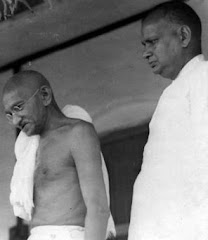We drove north east
of Aqraba along many little dirt roads and arrived at the edge of a
valley.
On the way in we had
passed many fields, flat land with stone walls around them, but there
are no crops or plowed land. We are told that people want to farm
their land but are afraid to because the settlers come and stay with
guns - even though they own no land here. We are told the settlers
know they can not quite take this land yet but they come to scare the
owners away from using their own land and that is the first step.
We arrive a a small
flat spot to park the car on the edge of a beautiful narrow valley in
the distance we can see the Jordon Valley stretching over to the high
land of Jordon. Here we find young olive trees broken off and/or
uprooted. Some still had the labels around their trunks from the
nursery. About 50 trees in total had been killed but it was hard to
count them because the terrain is steep and the trees were not
planted in nice rows but are planted a tree or two here or there
where every there is room for a small terrace. Who ever killed these
trees had to work at it. The elevation change from the parking area
to the lowest trees must have been 200-300 feet and the trees are
hard to find scattered around in no predictable pattern, where ever
there is a little soil.




There is a settler
who drives over to here all most daily and sits for an hour or two in
the morning and returns for an hour or two in the afternoon. While
he does not stop Majed who he knows owns this land he is being sure
no one else comes, especially to the flatter more desirable fields.
Since the settler is the only one who is ever around Majed asked him
why he would do such a thing as kill his trees. The settler told him
that he did not do it is was one of Majed´s neighbors who did it.
Thinking back over the empty fields we traveled through to get here
it is hard to imagine who this imaginary neighbor could be or where
he would have come from.
Majed´s father and
grandfather lived here on this land year around. We see the
foundations and remnants of several cottages. They had everything
they needed right here. There is water in the spring down in the
valley, they grazed cows and sheep and they grew wheat, fruit and
vegetables. They had no need to go to Aqraba. They stayed on the farm
in this beautiful little valley. But now the family is not allowed to
live here.
We see a few tired
almond trees and it is explained that they used to grow almonds. This
area used to grow 14 tons of almonds a year. But almonds take a lot
of care and now since the settlers harass and threaten the farmers
they can not give the almonds the care they need so they have mostly
died. Now, those who can plant olives. Olives can survive without
being fussed over.
 |
| This amazingly small ditch catchs the rain water and funnels it into the cisteren |
 |
| captured rain water saved for irrigation |
This land was all
part of the life in Aqraba. They all had farms here and most people
in Aqraba live out here for 4 months in the spring. Some, like the
Banijamas, stayed all year. As we walk around Sammi collects leaves
to roll warak dawali, a mustard for salads and other greens. They say
the people in Aqraba will be surprised because the plants in this
protected valley is a month ahead of Aqraba.
Across the stream on
the opposite hill we can see a cinder block house, the only house
around. This was another family that lived out here year around. In
1967 when the owner died his son moved in. But the Army would not
let him stay so the house and land have been vacant since then.
We hear that even
shepherds can not use this land. Some settlers surrounded a shepherd
armed with stones and axes, they hit him many times and tied his
hands – they were going to kill him. Word got to Aqraba and the
villagers ran to his rescue and saved him. Since then no one has
been allowed to enter the area.
 |
| Track that goes around hill to next valley where his uncle owns, but is not even allowed to go to it. |
Majeds uncle owns
land in the next little valley, like this one, with a spring, but
bigger and nicer. We can see a track on the hill side on the other
side of the stream that leads around to his family farm. Last spring
15-20 people went over to his Uncles place. When they came back there
was a group of settlers standing in the parking area shoulder to
shoulder blocking the way back to their cars. They asked Why are you
here¨ They were looking for a confrontation. ¨We just visit our
land.¨ The settlers called the army and said the Palestinians been
over yelling and throwing stones at settlers. The army came with guns
and believed the settlers. They tried to arrest and take two people
of our children, but we were able to keep that from happening. Before
the soldiers left they said next time don't come back here.
We heard that in
1969 a helicopter flew over this whole area spraying it all with
herbicides. These fields were all in wheat but it all died. After
killing the crops they declared much of it a closed military area and
no one is allowed to be in it.
I heard Majed
yelling a hello at someone across the valley and talking with them,
but I could not see anyone. When I moved to where I could see him I
realized he was just talking on his cell phone.
At one point I could
see a half dozen people on the far hill. When I pointed them out no
one said anything but there was a new tension in our group and people
moved visibly faster. But when I pointed it out to Majed he said they
were Palestinians on the path to another valley. Then everyone
relaxed. But it pointed out to me the apprehension everyone lives
under.
 |
| piled rocks tell shepherds that there are crops here and not to grazz anmilals |
 |
| Flowers bloom in any crak in the rocks |
 |
| Majeds family has used this tree for a hundred years, resting, eating, having coffee under it |
 |
| looking down the valley. the far hills are in jordon |
 |
| looking up the valley |
 |
| Land that was all farmed by Aqraba residents. Now they cant use it. |
 |
| the road home |
 |
| The road home |













No comments:
Post a Comment